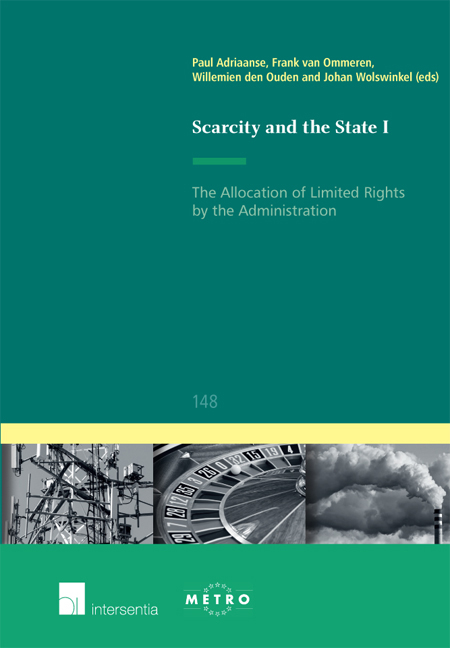Book contents
- Frontmatter
- Foreword
- Editors’ Preface
- Contents
- Part I General Perspectives
- Chapter 1 The Allocation of Limited Rights by the Administration: A Quest for a General Legal Theory
- Chapter 2 The Allocation of Limited Public Rights: An Analytical and Constitutional Approach
- Chapter 3 The Allocation of Limited Public Rights from the Perspective of the EU Legislator
- Chapter 4 Challenges for the National Legislator: The Allocation of Limited Rights by the Administration
- Chapter 5 The Allocation of Limited Rights by the Administration: Challenges of Legal Protection
- Part II Eu Law Perspectives
- Part III Comparative Law Perspectives
- List of Contributors
- Ius Commune Europaeum
Chapter 4 - Challenges for the National Legislator: The Allocation of Limited Rights by the Administration
from Part I - General Perspectives
Published online by Cambridge University Press: 22 September 2018
- Frontmatter
- Foreword
- Editors’ Preface
- Contents
- Part I General Perspectives
- Chapter 1 The Allocation of Limited Rights by the Administration: A Quest for a General Legal Theory
- Chapter 2 The Allocation of Limited Public Rights: An Analytical and Constitutional Approach
- Chapter 3 The Allocation of Limited Public Rights from the Perspective of the EU Legislator
- Chapter 4 Challenges for the National Legislator: The Allocation of Limited Rights by the Administration
- Chapter 5 The Allocation of Limited Rights by the Administration: Challenges of Legal Protection
- Part II Eu Law Perspectives
- Part III Comparative Law Perspectives
- List of Contributors
- Ius Commune Europaeum
Summary
Introduction
The idea that limited authorisations – and to a lesser extent: limited grants – might be allocated in a different way than in the order of the receipt of the applications, is an idea that in the world of general administrative law still does not get sufficient attention. Many licensing public authorities are unsure or have no idea of what is possible – at least in theory. One of the most important measures to offer more insights and certainties is a smart applicable national regulatory framework. The aim of this piece is to deliver a prime and modest contribution to this, by developing a general regulatory framework that can serve as a template.
As stated in the introductory Chapter of this book, with limited authorisations and grants I mean that the number of authorisations and grants has been limited to a certain maximum. This limited character raises the fundamental question how the administration should allocate these public rights.
The allocation of limited authorisations and grants confronts the national legislator with new questions; questions which until now had been overlooked or left unconsidered. In any event, the allocation of limited authorisations and grants will give the legislator much to think about. To prevent misunderstandings, with the national legislator I mean every qualified legislator within a national context. This can be the authorized legislator at a state level, but also a competent regional or local public authority with the power to legally establish general binding rules, delegated rulemaking included. This piece goes neither into the room the EU legislator leaves to the national legislator nor into the national obligation to implement EU directives that regard limited rights. The role of the EU legislator in the discourse on limited authorisations and grants has thus far been rather modest.
For this contribution I take a general perspective, independent of the legal system of a certain state, although I will give a few examples from the Dutch legislative practise. Writing in general terms about national regulations confronts us with a well-known difficulty: every legal system has its own specific characteristics. To overcome this problem I will use a few insights that are recognizable from general regulatory doctrine. Without those notions it would be almost impossible to paint a picture of a general regulatory framework.
- Type
- Chapter
- Information
- Scarcity and the StateThe Allocation of Limited Rights by the Administration, pp. 73 - 92Publisher: IntersentiaPrint publication year: 2016



